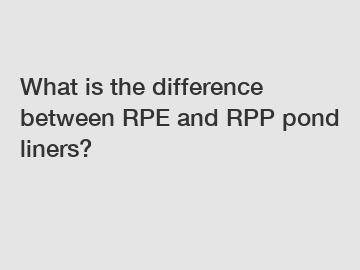What is the difference between RPE and RPP pond liners?
What is the difference between RPE and RPP pond liners?
RPE (Reinforced Polyethylene) and RPP (Reinforced Polypropylene) are two common types of liners used in the construction of ponds. While both serve the same purpose of preventing water leakage, there are distinct differences between them.
RPE pond liners are made from high-density polyethylene, which offers exceptional strength and durability. The reinforcement in RPE liners provides added tear and puncture resistance, making them suitable for various applications, including decorative ponds, fish ponds, and agricultural water storage. The reinforced design ensures that RPE liners can withstand harsh weather conditions and heavy use without deteriorating. Additionally, RPE liners are known for their UV resistance, which increases their longevity.

On the other hand, RPP pond liners are made from reinforced polypropylene, a material known for its excellent chemical resistance and flexibility. RPP liners are commonly used in applications such as waste containment, industrial ponds, and agricultural lagoons. The high chemical resistance of RPP liners makes them suitable for containing and protecting hazardous or corrosive substances. Furthermore, the flexibility of RPP liners allows for easy installation, especially in areas with irregular shapes or slopes.
The difference in materials used for RPE and RPP liners is the main factor that sets them apart. While RPE liners are made from high-density polyethylene, RPP liners are made from reinforced polypropylene. This leads to variations in their physical properties, chemical resistance, and application suitability.
The choice between RPE and RPP liners ultimately depends on the specific requirements of the pond project. If the primary concern is strength, durability, and UV resistance, RPE liners would be the ideal choice. However, if chemical resistance and flexibility are the key factors, RPP liners would be more suitable.
In conclusion, the difference between RPE and RPP pond liners lies in the materials used, resulting in variations in physical properties and application suitability. Understanding these differences is crucial for selecting the most appropriate liner for the specific pond project. Whether it is for decorative purposes, fishponds, or industrial applications, choosing the right type of liner ensures efficient water containment, longevity, and protection of the surrounding environment.
For more concrete protection liners custom, geogrid mesh, concrete protective liners manufacturerinformation, please contact us. We will provide professional answers.


